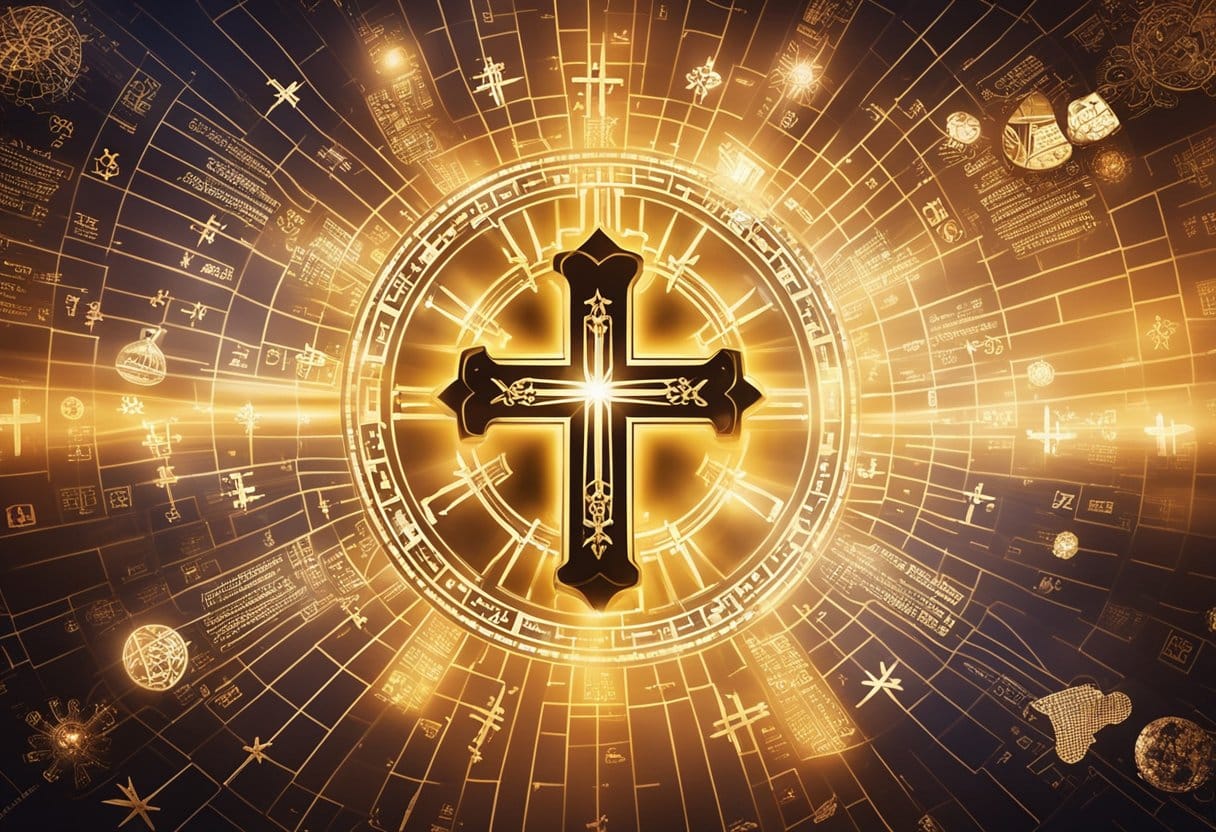If you’re a Christian, you likely believe that Jesus was both fully human and fully divine. But have you ever wondered if he was always human?
The concept of the incarnation – that is, the idea that God became human in the form of Jesus – is a central tenet of the Christian faith.
But how exactly did this work? Was Jesus always human, or did he become human at a certain point?

To answer these questions, we need to delve into the concept of the “God-man”.
This term refers to the idea that Jesus was both fully God and fully human at the same time. It’s a paradox that can be difficult to wrap your head around, but it’s an essential part of Christian theology.
The idea is that Jesus was not simply a human who was “adopted” by God or given special powers – he was God himself, who chose to take on human form.
So, was Jesus always human? The short answer is no. Before he was born on earth, Jesus existed in his divine form as part of the Trinity – the Father, Son, and Holy Spirit.
However, when he was born to Mary, he took on a fully human form while still retaining his divine nature.
This is known as the incarnation, and it’s a key part of the Christian understanding of who Jesus was and what he accomplished during his time on earth.
Was Jesus Always Human? The Incarnation of Christ
The concept of the Incarnation lies at the heart of the Christian faith. The Incarnation refers to the belief that the eternal Son of God, Jesus Christ, willingly took on human nature and became fully God and fully human at the same time.
This theological mystery is encapsulated in the opening verses of the Gospel of John: “In the beginning was the Word, and the Word was with God, and the Word was God” (John 1:1). “The Word became flesh and made his dwelling among us” (John 1:14).
Biblical Foundations
The Incarnation of Jesus has its biblical foundations in the Old Testament.
The prophet Isaiah prophesied about the coming of the Messiah, who would be both fully human and fully divine. “Therefore the Lord himself will give you a sign: The virgin will conceive and give birth to a son, and will call him Immanuel” (Isaiah 7:14).
The New Testament also provides evidence of the Incarnation. The Gospel of Matthew records the birth of Jesus, who was conceived by the Holy Spirit and born of the virgin Mary (Matthew 1:18-25).
The Gospel of Luke also records the birth of Jesus and emphasizes his true humanity (Luke 2:1-7). The Gospel of John explicitly states that Jesus is the Word who became flesh (John 1:14).
Theological Significance
The Incarnation of Jesus is of great theological significance. It affirms both the divine nature and the true humanity of Jesus. Jesus is not simply a divine being who appeared to be human, nor is he simply a human being who was elevated to divine status.
Rather, Jesus is one person with two natures: a divine nature and a true human nature.
The Incarnation also has significant implications for the Christian faith. It demonstrates God’s love for humanity, as God became one of us in order to save us.
It also provides a model for how Christians are to live, as Jesus lived a fully human life in obedience to God.
Jesus’ Human Life and Ministry

Jesus was born into a human family with Mary and Joseph as his parents. Joseph was a carpenter by trade, and Jesus likely learned the trade from him.
As a child, Jesus grew both physically and spiritually, as evidenced by Luke 2:52, which states that “Jesus grew in wisdom and stature and in favor with God and man.”
Early Life and Family
Jesus’ early life is not well-documented, but it is believed that he spent his childhood in Nazareth with his family.
His mother Mary was visited by an angel who told her that she would give birth to the Son of God. Jesus was born in Bethlehem and was later raised in Nazareth.
Teachings and Miracles
Jesus began his public ministry at around age 30, and he spent the next three years teaching and performing miracles.
He preached about love, compassion, and forgiveness, and he performed many miraculous healings. He also fed thousands of people with just a few loaves of bread and fish.
Suffering and Compassion
Despite his teachings of love and compassion, Jesus faced much suffering during his time on earth. He was betrayed by one of his disciples, arrested, and sentenced to death.
He was beaten and mocked before being crucified. However, even amid his suffering, Jesus showed compassion for others. He forgave those who betrayed and crucified him, and he showed love to those who were hurting.
Throughout his life, Jesus prayed often and sought guidance from his heavenly Father.
He modeled a life of humility and service, and his teachings continue to inspire and guide people today.
The Hypostatic Union

If you have ever wondered how Jesus can be both fully God and fully human, then you are not alone.
This is a question that has puzzled theologians for centuries. The answer lies in the doctrine of the hypostatic union, which is the belief that Jesus Christ is one person with two natures: a divine nature and a human nature.
Fully God and Fully Man
The hypostatic union teaches that Jesus is fully God and fully man at the same time. This means that He has a divine nature and a human nature that are distinct yet united in one person.
Jesus was not half God and half man, nor was He a blend of the two. He was and is fully God and fully man.
As the divine Son, Jesus always existed as God (John 8:58), but at the incarnation, He took on a human nature (John 1:14).
This means that He became a human being while remaining fully God. The addition of human nature to the divine nature is what makes Jesus the God-man.
The Dual Nature’s Harmony
The hypostatic union is a mystery that is beyond our full comprehension. However, we can understand that the two natures of Jesus are in perfect harmony.
Jesus did not have a split personality, nor did He switch between His divine and human natures. Instead, He lived His life as one person with two natures.
The human nature of Jesus allowed Him to experience all the joys and sorrows of humanity. He was born as a baby, grew up, ate food, and felt pain. He was tempted in every way that we are, yet without sin (Hebrews 4:15). At the same time, His divine nature allowed Him to perform miracles, forgive sins, and ultimately, to die on the cross for our sins.
In summary, the hypostatic union is the belief that Jesus Christ is one person with two natures: a divine nature and a human nature. He is fully God and fully man at the same time.
This doctrine is central to our understanding of who Jesus is and what He accomplished as our mediator between God and man (1 Timothy 2:5).
It is also a reminder that Jesus is not just a historical figure, but a living person who still intercedes for us today (Hebrews 7:25).
The Death and Resurrection

The Crucifixion
Jesus’ death on the cross is one of the most significant events in human history. He willingly gave up his life to pay for the sins of humanity.
The cross is a symbol of his sacrifice and love for us. He suffered immense physical and emotional pain, but he never wavered in his mission to save us. The Gospel of John 12:27 records Jesus saying, “Now my soul is troubled, and what shall I say? ‘Father, save me from this hour’?
No, it was for this very reason I came to this hour.”
The crucifixion was a brutal and public execution method used by the Romans. Jesus was nailed to a wooden cross and left to die. The pain and suffering he endured were unimaginable. However, his death was not in vain.
Through his sacrifice, he paid the price for our sins and opened a way for us to have eternal life.
The Victory Over Death
Three days after his death, Jesus rose from the dead, conquering death and sin. This event is known as the resurrection.
It is the cornerstone of the Christian faith and the ultimate victory over death. The resurrection shows that Jesus was not just a man but also the Son of God.
The book of Hebrews 5:7 says, “During the days of Jesus’ life on earth, he offered up prayers and petitions with fervent cries and tears to the one who could save him from death, and he was heard because of his reverent submission.”
Jesus’ resurrection is proof that his prayers were heard, and his sacrifice was accepted.
After his resurrection, Jesus appeared to his disciples and many others, proving that he was alive. He then ascended into heaven, leaving behind the promise of his return.
The resurrection and ascension of Jesus are essential to the Christian faith, and they give us hope for our future.
In conclusion, Jesus’ death and resurrection are the foundation of the Christian faith. They show us the depth of his love for us and the power of his sacrifice.
Through his death, we have forgiveness of sins, and through his resurrection, we have eternal life.
Implications for Faith and Worship

As a Christian, the belief in Jesus as the Son of God and Savior is central to your faith. The fact that Jesus was always human has significant implications for your worship and understanding of his mission.
Jesus as the Mediator
One implication of Jesus’ permanent humanity is that he serves as a mediator between God and humanity.
As a human, he understands the struggles and temptations that people face, and as the Son of God, he can intercede on their behalf.
This is a comforting thought for many believers, as it means that Jesus is not distant or aloof; rather, he is intimately aware of your struggles and always ready to help.
The Role of Jesus in Salvation
Another implication of Jesus’ humanity is that it underscores the importance of his mission on Earth. Through his life, death, and resurrection, Jesus provided a way for people to be reconciled with God and receive salvation.
This is the foundation of the Christian faith and is celebrated each year during the Advent and Christmas seasons.
As a disciple of Jesus, it is important to respect and honor his humanity, as well as his divinity. While he is the Son of God, he is also a human being who experienced joy, pain, and suffering.
This is especially important when teaching children about Jesus, as it helps them understand that he is not simply a distant figure to be worshipped, but rather, a friend and guide who understands their struggles.
So, was Jesus always human? Yes! And that has significant implications for your faith and worship.
It reminds you that Jesus is not distant or aloof; rather, he is intimately aware of your struggles and always ready to help. It also underscores the importance of his mission on Earth and provides a foundation for your faith.
By respecting and honoring Jesus’ humanity, you can deepen your relationship with him and grow as a disciple.
